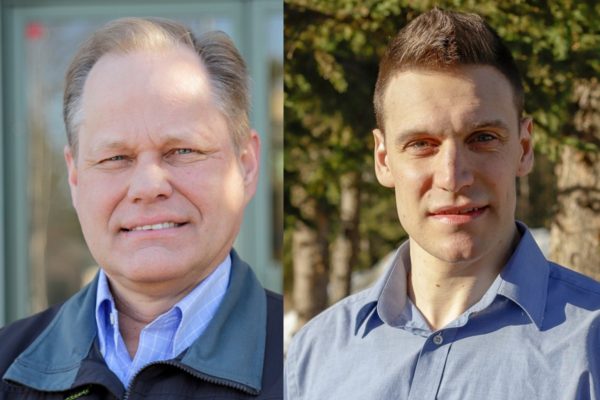
Anchorage voters still have about a week to cast their ballots as the city chooses its next mayor in a runoff election.
The two candidates, East Anchorage Assembly member Forrest Dunbar and retired commercial pilot Dave Bronson, are in the middle of a contentious race as they try to amass support for starkly different visions for Alaska’s largest city.
Here’s where they come down on the issues, and more on their backgrounds.
What are their backgrounds?
Forrest Dunbar grew up in rural Alaska and has served on the Assembly since 2016. He’s a captain in the Army National Guard and has been involved in the city’s pandemic response over the last year. Dunbar has also worked on community improvement projects both on and off the Assembly over the years.
Dave Bronson is a retired commercial airline pilot who also served in the Air Force. He’s spent more than 20 years as a military officer and lived in Anchorage for 30 years. Bronson has never held elected office, but says his leadership experience with the military and in the private sector give him a different “results-oriented” perspective on how to improve government.
RELATED: Anchorage mayor candidates debate visions for the city
How are they planning to respond to the pandemic?
Bronson entered the race over the summer in the midst of backlash over the city’s health restrictions and CARES Act spending. He describes himself as a “limited government” person and strongly disagrees with emergency orders like the mask mandate, capacity restrictions in businesses and the shutdowns over the last year. He says those kinds of health measures should be a matter of personal choice.
“If we would have stuck with the original plan, which was to go with social distancing, and those people with comorbidities staying home and letting everyone else go back to work, we wouldn’t be dealing with the economic crisis that we’re facing right now,” Bronson said at an Alaska Public Media forum on Monday.
Dunbar, on the other hand, has voted in support of many of those emergency orders and points to data from state and local health officials who say mask orders, limiting gatherings and other precautions have helped minimize the death rate and have kept hospital ICUs from overflowing.
“If we hadn’t had these health controls, we would have had far more people get seriously ill and far more people die,” Dunbar said at Monday’s forum. “It wasn’t the shutdowns that harmed the economy. It was the pandemic.”
When it comes to economic recovery after the pandemic, Bronson has focused on the idea that the city needs to reopen and people will get their jobs back. With no remaining gathering or business restrictions, it seems the summer may look fairly normal already, but Bronson says he also wants to rebate businesses property taxes from periods during which businesses may have been shut down. He doesn’t have a definitive plan on how rebates will be funded yet.
Both candidates say federal relief money will be key, though Dunbar says he wants to prioritize equity in distributions since marginalized communities have been hit harder by the pandemic. Bronson says factors like ethnicity shouldn’t be part of the process.
What about non-pandemic issues?
Homelessness
Dunbar supports integrating homeless resources throughout the city. Bronson favors consolidating them.
Bronson says the city needs to continue its public-private partnerships but says law enforcement should be used to address the issue.
“We need to intervene. If you’re breaking the law on the street, no one is above the law,” Bronson said in an interview. “So if you are defecating or urinating on the street, that is against the law. And we’ve turned a blind eye to that.”
Dunbar supports prior Assembly work to shift the city’s mental health response from police to behavioral health experts. He also says law enforcement should not be a primary tool to address homelessness.
“The idea that people are immune to criminal prosecution, because they’re homeless is also not true. If they are engaging in criminal acts, they are subject to arrest and prosecution,” said Dunbar. “But ultimately, that can’t be the primary solution at all, it has to be housing, treatment, employment.”
Policing
Dunbar supported expanding the Anchorage Police Department by about 100 sworn officers under Mayor Berkowitz’s administration and wants to maintain it between 430 and 450 sworn officers. Bronson says he’d like to see the force expand to closer to 500.
Dunbar also says he would like to hire Acting Chief Ken McCoy as the department’s permanent chief, since McCoy was previously deputy chief and worked with the city and Assembly for years. Bronson says he would conduct a thorough vetting process and could not guarantee McCoy would be the permanent chief.
Budget
Bronson believes property taxes are too high and said he thinks every department of government should see some cuts, except for police. At Monday’s forum he estimated cuts at 5-8% for most departments.
“The notion that I’m going to sit there and slash the budget and do draconian things — my opponent says I’m going to close the library and attack schools. No, but the library and the schools have to look at operating within their budgets,” Bronson said. “Either that or we’re going to come to a financial crisis here.”
Dunbar supports maintaining city spending, arguing Bronson’s proposed cuts will hurt services such as emergency response.
“The budget is balanced now. Mr. Bronson is going to manufacture a crisis and then he’s going to have very deep cuts,” Dunbar said. “We need to preserve critical services. We’ve diversified our revenue, we’ve largely decoupled from the state. We have a balanced budget.”
Dunbar also says the municipality is too reliant on property taxes and is in favor of diversifying revenue through interest from the sale of ML&P, the existing alcohol and tobacco taxes, motor fuel tax and possibly other sources.
Housing affordability
Both candidates agree there isn’t enough affordable housing in Anchorage and building in the municipality is too expensive and cumbersome.
Dunbar says he thinks the city planning department should be restructured to make it easier for developers to get construction approved. Bronson says Title 21 and Title 23, city codes around building safety and planning, should be looked at to make it less expensive to build.
Dunbar also supports more infill housing and renovating existing properties to increase housing density.
Why does this election feel so contentious?
The mayor’s seat isn’t partisan and both candidates say they don’t see this as a partisan fight, but they both describe each other as too extreme for Anchorage.
“[Bronson] is very much connected to the most fringe elements of our politics,” Dunbar said last month, adding that Bronson launched his campaign with the support of Assembly member Jamie Allard while the Save Anchorage movement was ramping up over the summer. Meanwhile, Bronson describes Dunbar as a “radical leftist.”
Back and forth rhetoric during the campaign has gotten heated — a Bronson ad from March referred to Assembly members as “a bunch of idiots.” At a televised debate last week, Dunbar asked Bronson to “please stop lying” about the city’s homelessness response. Later Bronson told Dunbar “you don’t have the sense God gave an anvil” when it came to budget issues.
Dunbar’s campaign has also criticized Bronson for skipping public forums, and filed multiple complaints to the state Public Offices Commission about the Bronson campaign’s alleged finance violations.
The mayor’s race is reflective of the political atmosphere in Anchorage, which candidates, observers and voters say has never felt more divided.
Bronson says the city’s public health restrictions are to blame for the division.
“We don’t need any more division, we need a little bit of unity here. And this Assembly has divided us for many months by pitting us one against the other,” he said on Monday.
Dunbar says his experience in government is best suited to building a “coalition” across the political spectrum to lead the city.
“The vast majority of work that’s done on the Assembly and municipality is non-partisan — it’s roads, drainage, police, fire, it’s things that shouldn’t be partisan. It shouldn’t be nationalized issues, either.”
Both candidates say they will govern for all of Anchorage, if elected.
Kavitha George is Alaska Public Media’s climate change reporter. Reach her at kgeorge@alaskapublic.org. Read more about Kavitha here.





